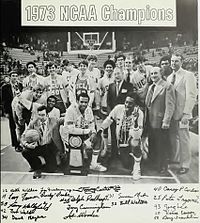
The 1982 NCAA Division I men's basketball tournament involved 48 schools playing in single-elimination play to determine the national champion of men's NCAA Division I college basketball. It began on March 11, 1982, and ended with the championship game on March 29 in the Louisiana Superdome in New Orleans, Louisiana. A total of 47 games were played.

The 2007 NCAA Division I men's basketball tournament involved 65 teams playing in a single-elimination tournament to determine the national champion of men's NCAA Division I college basketball as a culmination of the 2006–07 basketball season. Team selections were announced on March 11, 2007, and the tournament began on March 13, 2007, with the Opening round game and concluded with the championship game on April 2 at the Georgia Dome in Atlanta, Georgia.

The 1975 NCAA Division I Basketball Tournament involved 32 schools playing in single-elimination play to determine the national champion of men's NCAA Division I college basketball. It began on March 15, 1975, and ended with the championship game on March 31 at the San Diego Sports Arena, now known as Pechanga Arena San Diego, in San Diego, California. A total of 36 games were played, including a third place game in each region and a national third place game. This was the first 32-team tournament.
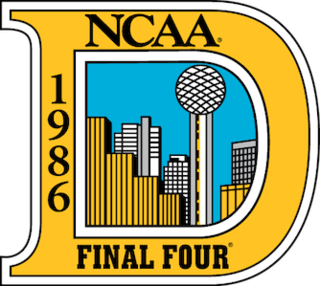
The 1986 NCAA Division I men's basketball tournament involved 64 schools playing in single-elimination play to determine the national champion of men's NCAA Division I college basketball. It began on March 13, 1986, and ended with the championship game on March 31 in Dallas, Texas. A total of 63 games were played.

The 1995 NCAA Division I men's basketball tournament involved 64 schools playing in single-elimination play to determine the national champion of men's NCAA Division I college basketball. It began on March 16, 1995, and ended with the championship game on April 3 at the Kingdome in Seattle, Washington. A total of 63 games were played.
The 1969 NCAA University Division men's basketball tournament involved 25 schools playing to determine the national champion of men's NCAA Division I college basketball. It began on March 8, 1969, and ended with the championship game on March 22 in Louisville, Kentucky. Including consolation games in each of the regions and an overall consolation game, a total of 29 games were played.
The 1970 NCAA University Division Basketball Tournament involved 25 schools playing in single-elimination play to determine the national champion of men's NCAA Division I college basketball. It began on March 7, 1970, and ended with the championship game on March 21 in College Park, Maryland. A total of 29 games were played, including a third place game in each region and a national third place game. This tournament was notable for the number of small schools that reached the Sweet 16, Elite 8, Final 4, and Championship Game. Another notable aspect of the tournament was that Marquette became the first team to turn down an announced NCAA Tournament bid for the National Invitation Tournament. Coach Al McGuire took issue with being seeded in the Midwest regional instead of the geographically closer Mideast. They were replaced in the field by Dayton. As a result of this action, the NCAA forbid its members from playing in other postseason tournaments if offered an NCAA bid.

The 1971 NCAA University Division Basketball Tournament involved 25 schools playing in single-elimination play to determine the national champion of men's NCAA Division I college basketball. It began on March 13, 1971, and ended with the championship game on March 27 in Houston, Texas. A total of 29 games were played, including a third place game in each region and a national third place game.

The 1972 NCAA University Division Basketball Tournament involved 25 schools playing in single-elimination play to determine the national champion of NCAA University Division college basketball. It began on Saturday, March 11, and ended with the championship game in Los Angeles on Saturday, March 25. A total of 29 games were played, including a third place game in each region and a national third place game.

The 1974 NCAA Division I Basketball Tournament involved 25 schools playing in single-elimination play to determine the national champion of men's NCAA Division I college basketball. It was the first tournament to be designated as a Division I championship—previously, NCAA member schools had been divided into the "University Division" and "College Division". The NCAA created its current three-division setup, effective with the 1973–74 academic year, by moving all of its University Division schools to Division I and splitting the College Division members into Division II and Division III. Previous tournaments would retroactively be considered Division I championships.

The 1976 NCAA Division I Basketball Tournament involved 32 schools playing in single-elimination play to determine the national champion of men's NCAA Division I college basketball. It began on March 13, 1976, and ended with the championship game on March 29 in Philadelphia. A total of 32 games were played, including a national third place game.

The 1977 NCAA Division I Basketball Tournament involved 32 American schools playing in single-elimination play to determine the National Champion of Men's NCAA Division I college basketball. It began on Saturday, March 12, 1977, and ended with the championship game on Monday, March 28 in Atlanta. A total of 32 games were played, including a national third place game. This was the final tournament in which teams were not seeded.

The 1978 NCAA Division I Basketball Tournament involved 32 schools playing in single-elimination play to determine the national champion of men's NCAA Division I college basketball. It began on March 11, 1978, and ended with the championship game on March 27 in St. Louis, Missouri. A total of 32 games were played, including a national third place game.
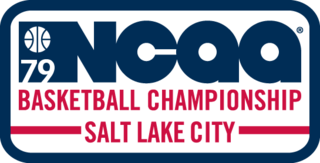
The 1979 NCAA Division I Basketball Tournament involved 40 schools playing in single-elimination play to determine the national champion of men's NCAA Division I college basketball. It began on March 9 and ended with the championship game on March 26 in Salt Lake City. A total of 40 games were played, including a national third-place game. This was the tournament's only edition with forty teams; the previous year's had 32, and it expanded to 48 in 1980. The 1979 Indiana State team was the most recent squad to reach a national title game with an undefeated record, holding that distinction for 42 years until the 2021 Gonzaga Bulldogs team won a 93-90 OT national semifinal over UCLA to reach the 2021 title contest vs. Baylor with a 31-0 record.

The 1980 NCAA Division I Basketball Tournament involved 48 schools playing in single-elimination play to determine the national champion of men's NCAA Division I college basketball. It began on March 6th, 1980, and ended with the championship game on March 24th at Market Square Arena in Indianapolis. A total of 48 games were played, including a national third-place game.
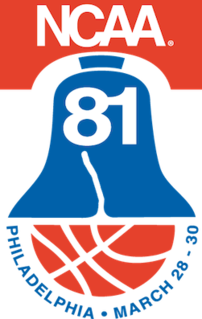
The 1981 NCAA Division I Basketball Tournament involved 48 schools playing in single-elimination play to determine the national champion of men's NCAA Division I college basketball. It began on March 12, 1981, and ended with the championship game on March 30 in Philadelphia. A total of 48 games were played, including a national third place game. It was also the last tournament to be televised on NBC, before CBS took over the following year. Additionally, it was the last season in which the NCAA sponsored championships only in men's sports; the first Division I Women's Tournament would be played the following year.

The 1983 NCAA Division I men's basketball tournament involved 52 schools playing in single-elimination play to determine the national champion of men's NCAA Division I college basketball. It began on March 17, 1983, and ended with the championship game on April 4 at The Pit, then officially known as University Arena, on the campus of the University of New Mexico in Albuquerque. A total of 51 games were played.
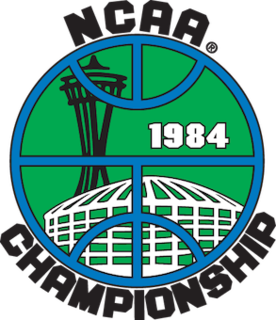
The 1984 NCAA Division I men's basketball tournament involved 53 schools playing in single-elimination play to determine the national champion of men's NCAA Division I college basketball. It began on March 13, 1984, and ended with the championship game on April 2 in Seattle. A total of 52 games were played. This was the last tournament in which some teams earned first-round byes as the field expanded to 64 teams beginning in the 1985 tournament when each team played in the first round. It was also the second year with a preliminary round; preliminary games would not be played again until 2001.

The 1985 NCAA Division I men's basketball tournament involved 64 schools playing in single-elimination play to determine the national champion of men's NCAA Division I college basketball. This was the first year the field was expanded to 64 teams, from 53 in the previous year's tournament. It began on March 14, 1985, and ended with the championship game on April 1 in Lexington, Kentucky. A total of 63 games were played.
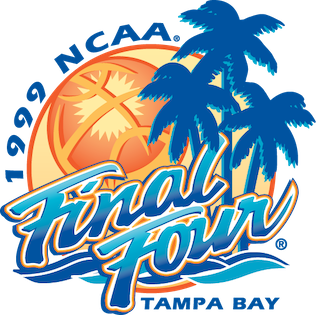
The 1999 NCAA Division I men's basketball tournament involved 64 schools playing in single-elimination play to determine the national champion of men's NCAA Division I college basketball. It began on March 11, 1999, and ended with the championship game on March 29 at Tropicana Field in St. Petersburg, Florida. A total of 63 games were played. This year's Final Four was the first—and so far, only—to be held in a baseball-specific facility, as Tropicana Field is home to the Tampa Bay Rays.

